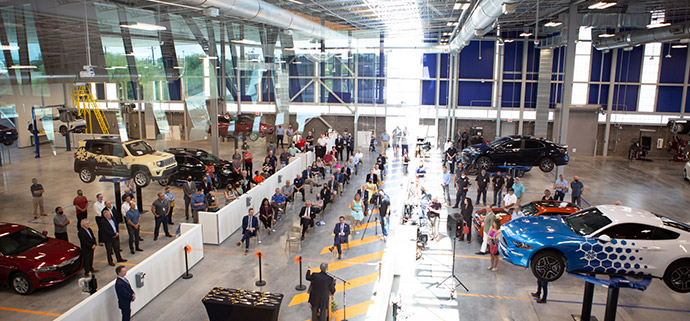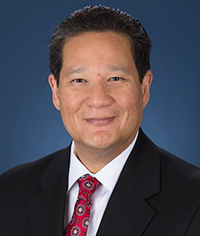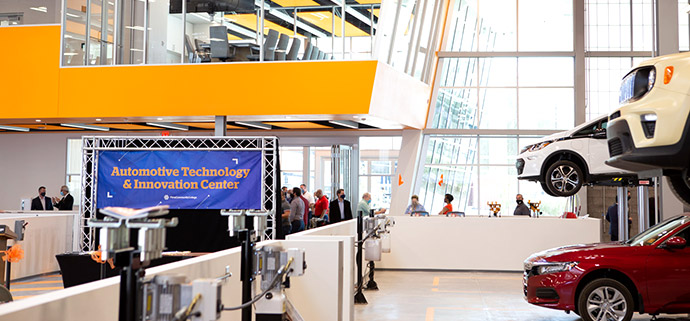Pima Community College unveiled its new automotive tech center in downtown Tucson with a goal to help meet high demand for skilled technicians in the industry, including Arizona’s growing electric and autonomous vehicle manufacturing sector.

The opening of the Automotive Technology and Innovation Center is just the start of a major effort by the district to expand technical training to produce tech workers in other fields and stimulate the local economy.

It’s also the realization of a long sought-after goal for Chancellor Lee Lambert, who came to the district in 2013.
“I think there’s many of you in this community, I know especially the dealers and all the other automotive folks, you’ve been waiting for this moment,” Lambert said at the recent ribbon cutting for the center.
Programs in diesel, electric and autonomous vehicles
Located at the school’s downtown Tucson campus, the two-story, 50,000 square feet center will support programs in diesel, electric and autonomous vehicles and increase training for specific brands such as Ford, Fiat-Chrysler and Subaru.
Students can study engine diagnosis and repair, electrical fundamentals, steering, alignment, brakes and other programs.
Education paying off for grads
Automotive technicians who complete a two-year Automotive Technology Associate degree earn over 20 percent more, on average, than a technician without a degree, college officials said. An automotive technology degree also is a step towards other careers in the field, whether as a dealership manager, mechanic, salesperson or specialist focused on improving the future of automotive technology, school officials said.
Technicians in Arizona are earning an average $22.41 per hour, about 8 percent higher than the national average, according to employment website Indeed.
Severe auto tech shortage
There are plenty of positions available for grads. By 2024, the industry is projected to be short by approximately 642,000 automotive, diesel, and collision technicians, according to a report issued by the Phoenix-based TechForce Foundation last year.
Citing both increasing demand for professional techs and a declining supply of new techs entering the industry, the study concluded that the technician shortage continues despite a slight uptick in new post-secondary degrees and certificates for diesel technicians.
Other Centers of Excellence: aviation, IT, healthcare, hospitality, and more
Under Lambert’s vision, Pima is developing other Centers of Excellence in applied technology, information technology, health professions, public safety and security, hospitality and tourism, and arts and humanities.
The centers pair state-of-the-art facilities with industry partners to prepare students for new generation careers. Here’s a look at a few of them:
Aviation technology
Located at Tucson International Airport in dedicated hangar space, the new Aviation Technology Center is part of the Center of Excellence in Applied Technology. The Center, which will make it possible for the college to double the number of students currently in the program, is under construction and slated for completion by early 2022.
Health professions
The Center of Excellence in Health Professions is based at Pima’s West Campus and provides state-of-the-art training in multiple healthcare programs including nursing, surgical technology, respiratory care, medical laboratory technology, dental studies and more.
Information technology/cybersecurity
Located at the East Campus, the program is centered around the Arizona Cyber Warfare Range, the only “live-fire” cyber range at a community college. The range is operated by students and volunteers and provides a safe zone where IT professionals, community members and students can explore cyber attacks and defenses.
Public safety and security
This center features fire science and emergency medical services, law enforcement and administration of justice, and transportation and logistics.
Pima partners with industry and government including the U.S. Air Force to provide Medical Readiness Agency (AFMRA) to train airmen as nationally credentialed paramedics in an expedited program.
In a partnership with TuSimple, Pima also created the country’s first certificate to upskill truck drivers in autonomous truck operations — Autonomous Vehicle Driver and Operations Specialist Certificate.
For more information about these and the other centers, visit:
















Add comment